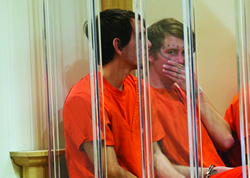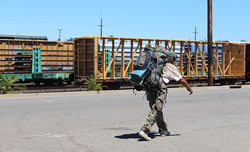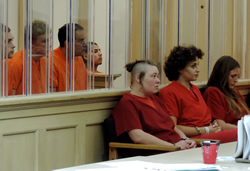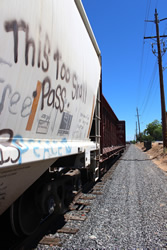The Last Tramp Fire
by Scott Thomas Anderson

A fourth rail-wanderer was brought into Placer County Court Monday, Aug. 4, arraigned on charges of murdering a young man who saw her world as a chance to be free. Now, as Charity Ann Williams joins her co-defendants in local custody, at least one person close to her is reflecting on how the isolated and underground subculture of train-hopping set the stage for an irreversible trajectory.
Final StopWilliams was arrested near Tacoma, Washington on June 29, some two months after SWAT members stormed a house in Nebraska City to capture Edward Anauo and Jewls Carrillo — both men accused of slaying 19-year-old John Alpert in a transient camp in Roseville. Laura Kenner had been apprehended the day before in Farmington, New Mexico. The raids that netted Anauo, Carrillo and Kenner happened a little over a week after Alpert’s family held a candlelight vigil in Palmdale to mourn the one year anniversary of his murder. Rumors flitted through the train yards of a fourth suspect.
Now, Williams sits motionless in court. Her silent and stoic demeanor stands in stark contrast to that of Anauo, who, on May 20 — sporting a new Mohawk he’d gotten in jail — leaned next to Carrillo in the defendant’s box, smiling and laughing as he watched the action surrounding his murder arraignment.
Williams on the other hand stares straight ahead until her case is called.
“Miss Williams, do you understand the charges against you?" asks Superior Court Judge Colleen Nichols.
“Yes, I do,” she replies attentively, making eye contact with the judge.
Nichols starts the process of having Placer County Defense Attorney David A. Brooks appointed to represent Williams in a full murder arraignment. In the meantime, the suspect’s days in the Auburn jail are a far cry from the steel lines that had just been her existence: Squatting an abandoned hotel in South Carolina; rolling a friend inside a tire near Blairsville, Pennsylvania; laying on the bottom cage of a train as the great Salt Lake blurs by in the rushing air — Williams documented it all. This courtroom could be the last stop in that sojourn.
The Hard Riders
They call her “Aggro.” From switchyards in Montana to rail stops in Florida, she has the reputation of being a traveler who can take care of herself.
One man who knows Williams — or “Aggro” — is Dave Kindred of Carlock, Ill. Kindred’s grandson Jared was a train hopper who was close to her. Despite spending most of his time in truck beds and campsites, Jared, or “Goblin,” occasionally came home to see his family. During a visit in October 2013 he brought Williams with him: The two of them had hitched onto a train out of Richmond, Virginia, before getting off in Jared’s hometown of Orange. That’s when Kindred had his first conversation with Williams. The older man was impressed by the keen perceptiveness under her tough exterior.
“She was smart, articulate, insightful, self-confident and unafraid,” Kindred remembers. “She had a very good grasp on who she was. She seemed like the most intelligent and least wasted of all of the train hoppers Jared was around.”
A few months later, in January 2014, Kindred’s memories of Williams came flooding back when Jared passed away from alcoholism. He was 25 years old.
In March, Williams showed up to Jared’s memorial service in Ashville, N.C. She and Kindred spent time talking about the young life that had just ended. Williams and a train hopper named Jimbo Davis had been with Jared in Philadelphia just 10 days before his death.

Since losing his grandson, Kindred has tried to piece together how the young man he knew could meet such an ending. He’s now confronting the idea that Jared’s story is loosely tied — primarily through Williams — to an unmerciful killing that happened in Roseville in March 2013. Kindred first learned about the murder of John Alpert while scanning online new stories. He began to follow the case out of simple curiosity in the rail world Jared had inhabited. However, when news broke in April that Anauo, Carrillo and Kenner had all been taken into custody on charges around Alpert’s slaying, Kindred immediately took notice.
“At the time I first read about Alpert, there wasn’t any connection to anyone I knew,” Kindred recalls. “Then when the first three arrests were made, I recognized Edward Anauo and Jewls Carrillo as people my grandson had been with. I didn’t know them, but I’d seen pictures of them together with Jared on Facebook. Now, it seems like all of the people who knew my grandson also knew Edward and Jewls.”

Kindred is aware Jared was bedridden with alcohol-related sickness in a hospital in North Carolina for the first half of 2013, during the period when Alpert was beaten to death. But even understanding that his grandson was forced off the rails during that dark moment doesn’t elevate the odd feelings that come with viewing images of him with Anauo and Carrillo. From what Kindred can tell, Jared first met Williams when he returned to the switchyards in June 2013, about three months after Alpert’s homicide.
Trying to piece more of his grandson’s life together, Kindred made arrangements to meet Williams in Chicago. They touched bases there in April. As Kindred talked about the train-hopper landscape with “Aggro,” he asked if she knew Anauo and Carrillo. She told him she did, and that Roseville police detectives had been calling a number of rail riders in an attempt to learn more about their network.
Three months later, Kindred read the news headline that Williams herself had been arrested as a fourth suspect in Alpert’s murder.
“I was stunned and saddened when I heard,” he admits. “Of course, I don’t know any details regarding what the police think her connection is.”

Kindred adds, “She sent me a letter from the jail in Tacoma … and I still think she’s an impressive person. I’m very interested to see what the evidence is that ties her to the case.”
In the meantime, Kindred has begun working on a book about Jared’s doomed life on the rails. Jared started grabbing freight cars at the age of 20, and kept riding for five years before his body failed him. In all that time, he never referenced the other murders that had happened on the tracks in the last 15 years — some tied to a gang called the Freight Train Riders of America— nor did he utter a word to lead his family to believe there was a risk.
“He didn’t make it sound like a dangerous life,” Kindred observes. “He was beaten up once in New Orleans and hospitalized for about 10 days, after he got knocked down and hit his head on concrete. But mostly when he talked about it, he made it sound like it was all fun — like it was just some kind of young man’s lark.”
